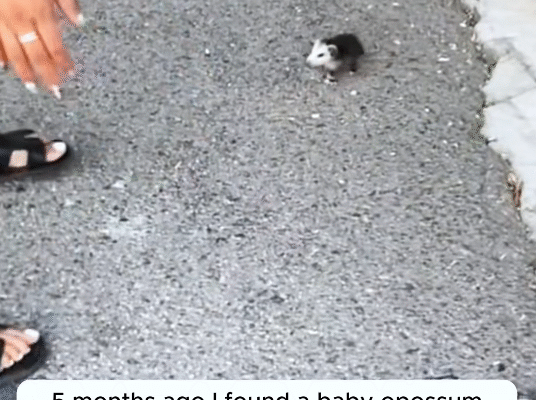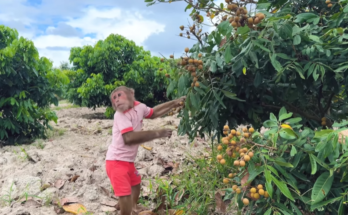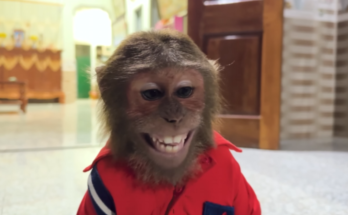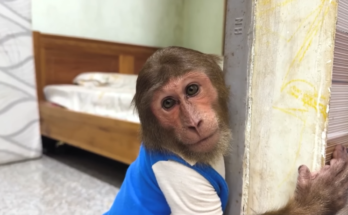It was supposed to be just another evening drive—windows down, the warm summer breeze against my face, and my favorite playlist humming through the speakers. I was heading home after visiting a friend who lived a few towns over, driving along a quiet country road lined with tall pines and wildflowers. The sky was tinged with orange and pink, the sun slipping behind the horizon, casting long shadows across the road. That’s when I saw it.
A tiny, motionless figure on the edge of the asphalt caught my eye. I slowed down, unsure whether it was a pile of leaves or something more. As I pulled over and stepped out, I realized it was a baby opossum, barely bigger than my hand, shivering and clinging to the gravel shoulder. My heart twisted. There were no other animals nearby—no mother, no siblings—just this fragile little creature all alone in the world.

I looked around, waiting, half-hoping that its mother would emerge from the brush, but the only sounds were crickets chirping and the wind rustling the grass. The opossum blinked up at me with watery black eyes. Its fur was patchy, and its long tail curled slightly as it tried to inch away from me. It looked scared, but it was too weak to move far.
Something inside me clicked. I couldn’t leave it there.
I gently scooped the baby opossum into a soft cloth I kept in my car for emergencies. I wasn’t sure what to do next, but I knew I couldn’t just abandon it. I drove the rest of the way home with one hand on the wheel and the other resting near the wrapped bundle in the passenger seat. I could feel it breathing—shallow and rapid.
When I got home, I made a quick nest out of an old shoebox, lined it with a towel, and placed the baby inside. I sat next to it for a long while, watching its tiny chest rise and fall. I looked up wildlife rescue resources on my phone and learned that baby opossums who are found alone often don’t survive without help. Ideally, they should be taken to a wildlife rehabilitator, but none were open that late at night.
So, I did what I could. I warmed up a heating pad and placed it under half the box, so the baby could choose a warm or cool spot. I researched how to feed orphaned opossums and, with the help of a small syringe from my first aid kit, offered it a homemade formula of diluted puppy milk replacement. To my surprise, it accepted it, latching onto the syringe with surprising strength.
I named it Oliver.
Over the next few days, I became completely devoted to this little life. Every few hours, I fed him. I kept him warm, talked to him softly, and watched as his eyes grew brighter and his movements more curious. He started climbing up the sides of the box and even onto my hand. I couldn’t believe how fast I fell in love.
At first, my friends and family thought I was crazy. “You adopted a what?” they’d laugh. “An opossum?” But when they saw him, their skepticism melted. He was undeniably adorable—fuzzy, with those round ears, pink nose, and a tail that curled like a question mark. He had this innocent, slightly confused expression that made everyone smile.
I made an appointment with a licensed wildlife rehabilitator to make sure I was caring for him properly. The rehabber was kind and thorough, and she was impressed with how healthy Oliver looked. She gently suggested that once he was strong enough, he should be released back into the wild. That’s when I realized that, as much as I loved him, he didn’t belong to me. He belonged to the woods, the stars, and the moonlit nights.
But for now, he still needed me.
Over the next several weeks, Oliver grew stronger and more independent. He started exploring my living room, climbing furniture, and hanging by his tail from the edges of blankets and shelves. He was playful, clever, and always curious. He especially loved blueberries—I could never keep a bowl full when he was around. He also had a strange affection for my slippers and would curl up inside them when he was sleepy.
Our bond deepened. He would fall asleep on my shoulder as I read, or curl up in the hood of my sweater. He didn’t make much noise, but he had a soft little chirp when he was happy or content. I learned to read his moods—the tilt of his head, the twitch of his tail. We had our own language, in a way.
As the months passed, Oliver started spending more time near the windows, watching the trees sway and the birds fly. I could sense the pull of the wild growing in him. I knew the time was coming.
When the day finally arrived to take him to the release site, I packed a small bag with some of his favorite fruits and carried him in a larger crate, lined with familiar blankets. The wildlife rehabilitator met me at the edge of a wooded preserve—far from any roads, cars, or people. It was a safe haven for animals like Oliver.
I opened the crate, my heart pounding. Oliver stepped out slowly, sniffing the air. He looked back at me for a long moment—those dark eyes holding mine—and then he turned and waddled into the underbrush.
I stood there for a while after he was gone, the silence pressing in around me. I felt a pang of emptiness, but also an overwhelming sense of peace. I had done something good. I had taken a tiny, abandoned creature and given him a second chance at life.
It’s been months now since that day, but I still think of Oliver often. Sometimes, when I walk in the woods near my home, I wonder if he’s out there, climbing trees, foraging for berries, maybe even raising a little family of his own. I like to believe he remembers me—not just as the strange human who fed him, but as someone who loved him deeply, even for a little while.
Adopting a baby opossum wasn’t something I ever imagined doing. But sometimes, life places you on a road you never expected to take—one that leads you straight into the heart of something wild, beautiful, and unforgettable.



